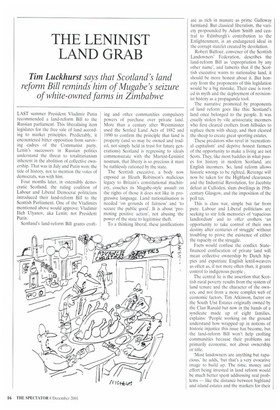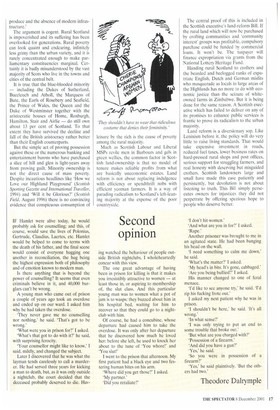THE LENINIST LAND GRAB
Tim Luckhurst says that Scotland's land
reform Bill reminds him of Mugabe's seizure of white-owned farms in Zimbabwe
LAST summer President Vladimir Putin recommended a land-reform Bill to the Russian parliament. This liberalising item legislates for the free sale of land according to market principles. Predictably, it encountered bitter opposition from surviving cadres of the Communist party. Lenin's successors in Russian politics understand the threat to totalitarianism inherent in the abolition of collective ownership. That was in July and Pu tin won; the tide of history, not to mention the votes of democrats, was with him.
Four months later, in ostensibly democratic Scotland, the ruling coalition of Labour and Liberal Democrat politicians introduced their land-reform Bill to the Scottish Parliament. One of the Vladimirs mentioned above would approve: Vladimir Ilich Ulyanov, aka Lenin; not President Putin.
Scotland's land-reform Bill grants croft ing and other communities compulsory powers of purchase over private land. More than a century after Westminster used the Settled Land Acts of 1882 and 1890 to confirm the principle that land is property (and so may be owned and traded, not simply held in trust for future generations) Scotland is regressing to ideals commensurate with the Marxist-Leninist nostrum, that liberty is so precious it must be ruthlessly rationed by the state.
The Scottish executive, a body now exposed as Heath Robinson's malicious legacy to Britain's constitutional machinery, couches its Mugabe-style assault on the rights of those it does not like in progressive language. Land nationalisation is needed 'on grounds of fairness' and 'to secure the public good'. It is about 'promoting positive action', not abusing the power of the state to legitimise theft.
To a thinking liberal, these justifications are as rich in manure as prime Galloway farmland. But classical liberalism, the variety propounded by Adam Smith and central to Edinburgh's contribution to the Enlightenment, is an endangered ideal in the corrupt statelet created by devolution.
Robert Balfour, convener of the Scottish Landowners' Federation, describes the land-reform Bill as 'expropriation by any other name', and laments that if the Scottish executive wants to nationalise land, it should be more honest about it. But honesty from the proponents of this legislation would be a big mistake. Their case is rooted in myth and the deployment of revisionist history as a propaganda tool.
The narrative promoted by proponents of land reform goes like this: Scotland's land once belonged to the people. It was cruelly stolen by vile aristocratic incomers who first cleared crofters from hillsides to replace them with sheep, and then cleared the sheep to create great sporting estates.
These predators who revel in 'recreational capitalism' and deprive honest farmers of the opportunity to make a living are not Scots. They, like most baddies in what passes for history in modern Scotland. are English incomers. So, land reform allows historic wrongs to be righted. Revenge will now be taken for the Highland clearances and the Industrial Revolution, for Jacobite defeat at Culloden, slum dwellings in 19thcentury Glasgow, and the imposition of the poll tax.
This is class war, simple but far from pure. Labour and Liberal politicians are seeking to stir folk memories of 'rapacious landlordism' and to offer crofters 'an opportunity to take control of their own destiny after centuries of struggle' without troubling to prove the existence of either the rapacity or the struggle.
Facts would confuse the conflict. Statefinanced confiscation of private land will mean collective ownership by Dutch hippies and expatriate English lentil-weavers as often as, if not more often than, it grants control to indigenous people.
The central lie is the assertion that Scottish rural poverty results from the system of land tenure and the character of the owners, and not from a more complex web of economic factors. Tim Atkinson, factor on the South Uist Estates originally owned by the Clan Ranald but now in the hands of a syndicate made up of eight families, explains: 'People working on the ground understand how wrapped up in notions of historic injustice this issue has become, but the land-reform Bill won't help crofting communities because their problems are primarily economic, not about ownership or title.
'Most landowners are anything but rapacious,' he adds, 'but that's a very evocative image to build up. The time, money and effort being invested in land reform would be much better spent addressing real problems — like the distance between highland and island estates and the markets for their produce and the absence of modern infrastructure.'
The argument is cogent. Rural Scotland is impoverished and its suffering has been overlooked for generations. Rural poverty can look quaint and endearing, infinitely less grimy than the urban variety, and it is rarely concentrated enough to make parliamentary constituencies marginal. Certainly it is badly misunderstood by the vast majority of Scots who live in the towns and cities of the central belt.
It is true that the blue-blooded minority — including the Dukes of Sutherland, Buccleuch and Atholl, the Marquess of Bute, the Earls of Rosebery and Seafield, the Prince of Wales, the Queen and the Duke of Westminster together with the aristocratic houses of Home, Roxburgh, Hamilton, Stair and Airlie — do still own about 13 per cent of Scotland. To that extent they have survived the decline and fall of the British aristocracy rather better than their English counterparts.
But the simple act of proving possession against these or the numerous banking and entertainment barons who have purchased a slice of hill and glen is light-years away from proving guilt. Minority ownership is not the direct cause of mass poverty. Despite incautious headlines like 'How we Love our Highland Playground' (Scottish Sporting Gazette and International Traveller, 1994) and 'Will it be Glorious?' (Scottish Field, August 1996) there is no convincing evidence that conspicuous consumption of leisure by the rich is the cause of poverty among the rural majority.
Much as Scottish Labour and Liberal MSPs revile men in Barbours and gels in green wellies, the common factor in Scottish land-ownership is that no model of tenure makes reliable profits from what are basically uneconomic estates. Land reform is not about replacing indulgence with efficiency or spendthrift nobs with efficient yeoman farmers. It is a way of parading radicalism to Scotland's left-leaning majority at the expense of the poor countryside.
The central proof of this is included in the Scottish executive's land-reform Bill. If the rural land which will now be purchased by crofting communities and 'community interest' groups was profitable, compulsory purchase could be funded by commercial loans. It won't be. The taxpayer will finance expropriation via grants from the National Lottery Heritage Fund.
Handing rural Scotland to crofters and the bearded and beclogged ranks of expatriate English, Dutch and German misfits who masquerade as locals in large areas of the Highlands has no more to do with economic justice than the seizure of whiteowned farms in Zimbabwe. But it is being done for the same reason. A Scottish executive which has failed to deliver on any of its promises to enhance public services is frantic to prove its radicalism to the urban majority.
Land reform is a diversionary sop. Like Leninism before it, the policy will do very little to raise living standards. That would take expensive investment in roads, reduced fuel taxes, lower business rates on hard-pressed rural shops and post offices, serious support for struggling farmers, and real honesty with deserving but misguided crofters. Scottish landowners large and small have made this case patiently and persistently, but devolution is not about listening to truth. This Bill simply persecutes owners for injustices they did not perpetrate by offering spurious hope to people who deserve better.























































































 Previous page
Previous page